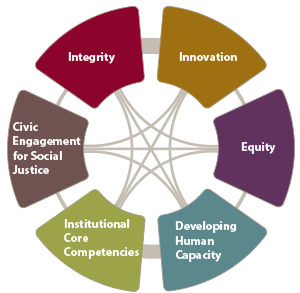
Our Vision
Empower all students to attain their educational goals, develop an equity-based mindset and become civic leaders in their communities.
Mission Statement
De Anza College provides an academically rich, multicultural learning environment that challenges students of every background to develop their intellect, character and abilities; to realize their goals; and to be socially responsible leaders in their communities, the nation and the world. The college is committed to equity and engages students in creative work that demonstrates the knowledge, skills and attitudes contained within the college’s Institutional Core Competencies:
- Communication and expression
- Information literacy
- Wellness and personal responsibility
- Civic capacity for global, cultural, social and environmental justice
- Critical thinking
- Quantitative reasoning
De Anza Values
 Integrity
Integrity
We embrace honesty, credibility, clear communication and acting on our stated values. We strive to acknowledge and address issues that may be difficult to broach. The college’s ability to fulfill its mission depends on a college community in which everyone feels included, respected and safe.
Innovation
In all of our many roles, we will continuously and purposefully reflect in order to innovate and improve. We work to ensure our physical space is welcoming, conducive to learning and environmentally sustainable. We are committed to being innovative in our daily work, curriculum and use of technology. We work with our students to be creative, flexible, imaginative and inventive, and to prepare to contribute to a world that will demand skills and competencies not yet in view.
Equity
We welcome students of all ages and backgrounds and connect with them, in their range of unique circumstances, to help them fulfill their dreams. We strive to design classes and services to the needs of those we serve. We value and embrace the intellectual contributions of a diverse spectrum of people and cultures. We strive for a diverse workforce that honors the contributions of all who work here.
Developing the Human Capacity of All Students
We will provide support in six key factors* of student success. Our students will be:
-
Directed, with a goal and the knowledge of how to achieve it.
-
Focused, staying on track to achieve that goal.
-
Nurtured, feeling that we want to, and do, help them to succeed.
-
Engaged, actively participating in class and extracurricular activities.
-
Connected, feeling that they are part of the college community.
-
Valued, with their skills, talents and abilities recognized, and with opportunities to contribute on campus and feel that their contributions are appreciated.
Institutional Core Competencies
The Institutional Core Competency statements are a promise that students who graduate with an associate degree or transfer to a university will demonstrate competency in six key areas. Students who earn a certificate or take courses for personal development will demonstrate at least one of the six areas.
- Communication and Expression: Students will communicate clearly, express themselves creatively, interpret thoughtfully and logically, and engage actively in dialogue and discussion, while paying attention to audience, circumstance and cultural context.
- Information Literacy: Students will recognize when information is needed and be able to locate, evaluate, synthesize and communicate information through appropriate resources and technologies – while understanding relevant social, legal and ethical issues.
- Wellness and Personal Responsibility: Students will understand key elements of physical and mental well-being, while engaging in self-reflection and ethical decision-making, exploring career choices and life goals, and practicing effective individual and collaborative work habits.
- Civic Capacity for Justice: Students will recognize their role as local, national and global citizens by participating in the democratic process, respecting social and cultural diversity, appreciating the complexity of the physical world, and understanding the significance of both environmental sustainability and social justice.
- Critical Thinking: Students will be able to interpret literary, artistic and scientific works and analyze arguments, evaluate ideas and solve problems by testing models, applying qualitative and quantitative analysis; estimating and predicting outcomes; verifying the reasonableness of conclusions; exploring alternatives and empathizing with different perspectives; and adapting ideas and methods to new situations.
- Quantitative Reasoning: Students will understand key elements of quantitative reasoning, enhancing their curiosity and ability to solve problems, make decisions, pursue innovation and take effective action by using and critiquing arguments based on data, mathematics and science.
Civic Engagement for Social Justice
We provide students with opportunities to enhance their potential for purposeful and productive lives. As a public institution, we contribute to the development of our local, state, national and global communities. We view our students and ourselves as agents of change, responsible for building the world in which all people are able to realize their dreams in ways that are environmentally sustainable and in alignment with the United Nations' Declaration of Human Rights.
*From "Student Support (Re)defined," a report by the Research and Planning Group for California Community Colleges, January 2013.

